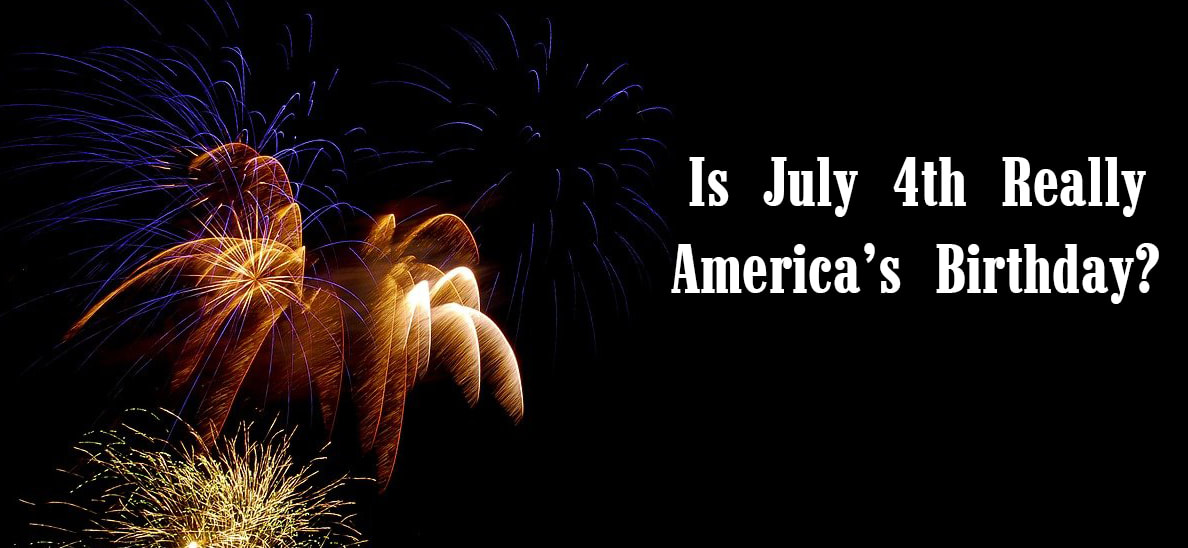|
July 4th, 1776, has long been celebrated as the birth of our nation, but is that really the day that America became independent of Britain? The first recorded celebration of the 4th of July occurred on the first anniversary of that date in 1777 in the city of Philadelphia, where the Declaration of Independence had been signed. A reporter in Philadelphia wrote of the event: “Yesterday the 4th of July, being the Anniversary of the Independence of the United States of America, was celebrated in this city with demonstration of joy and festivity … Thus may the 4th of July, that glorious and ever memorable day, be celebrated through America, by the sons of freedom, from age to age till time shall be no more. Amen, and amen.”
This reporter’s wish has come true, with the 4th being celebrated every year from that day forward for the past 240 years. But was this really the day on which the thirteen colonies ceased being colonies of England and became independent states? An important letter from John Adams to Horatio Gates gives us a hint to the answer. On March 23, 1776, more than two months before the Declaration of Independence was adopted, John Adams wrote: “I know not whether you have seen the Act of Parliament call’d the restraining Act, or prohibitory Act, or piratical Act, or plundering Act, or Act of Independency, for by all these Titles is it call’d. I think the most apposite is the Act of Independency, for King Lords and Commons have united in Sundering this Country and that I think forever. It is a compleat Dismemberment of the British Empire. It throws thirteen Colonies out of the Royal Protection, levels all Distinctions and makes us independent in Spight of all our supplications and Entreaties.” The act of parliament to which Adams was referring was the American Prohibitory Act, approved by King George on December 22, 1775. This act declared: “That all manner of trade and commerce is and shall be prohibited with the colonies … and that all ships and vessels of or belonging to the inhabitants of the said colonies … shall become forfeited to his Majesty, as if the same were the ships and effects of open enemies.” The Prohibitory Act included authorization for British privateers to fire upon and capture any American ship and claim its cargo as their own. This was, in essence, a declaration of war against America. It was a removal of the king’s hand of protection from the colonies and an authorization for his military to treat the Americans as enemies at war. Most modern Americans have forgotten about the Prohibitory Act, but it was one of the primary motivations for the Declaration of Independence. When the Continental Congress met on June 7, 1776, to debate the resolution for declaring independence, one of the arguments presented was: “That as to the king, we had been bound to him by allegiance, but that this bond was now dissolved by his assent to the late act of parliament, by which he declares us out of his protection, and by his levying war on us, a fact which had long away proved us out of his protection; it being a certain position in law that allegiance and protection are reciprocal, the one ceasing when the other is withdrawn.” This argument was eventually included in the Declaration itself in the line stating: “He has abdicated Government here, by declaring us out of his Protection and waging War against us.” The “certain position in law” that the colonists mentioned is a reference to a very prominent case in British history known simply as “Calvin’s Case.” In Calvin’s Case, the British Court ruled that: “As the subject oweth to the King his true and faithful ligeance and obedience, so the Sovereign is to govern and protect his Subjects, to rule and protect the subjects: so as between the Sovereign and subject there is a dual and reciprocal tie, because just as the subject is bound in obedience to the king, so the king is bound to the protection of the subject.” Thus, according to British law, the moment that King George affixed his signature to the American Prohibitory Act, the thirteen colonies ceased to be colonies of England and became thirteen independent states in America. The adoption of the Declaration of Independence on July 4th, 1776, was not the birth of our nation. It was an announcement, a declaration to the rest of the world that a new birth had taken place. Where once had been thirteen colonies of England there now stood thirteen independent states joined together in unison as the United States of America. Happy Independence (Announcement) Day!
0 Comments
Your comment will be posted after it is approved.
Leave a Reply. |
Bill Fortenberry is a Christian philosopher and historian in Birmingham, AL. Bill's work has been cited in several legal journals, and he has appeared as a guest on shows including The Dr. Gina Show, The Michael Hart Show, and Real Science Radio.
Contact Us if you would like to schedule Bill to speak to your church, group, or club. "Give instruction to a wise man, and he will be yet wiser: teach a just man, and he will increase in learning." (Proverbs 9:9)
Search
Topics
All
Archives
June 2024
|



 RSS Feed
RSS Feed